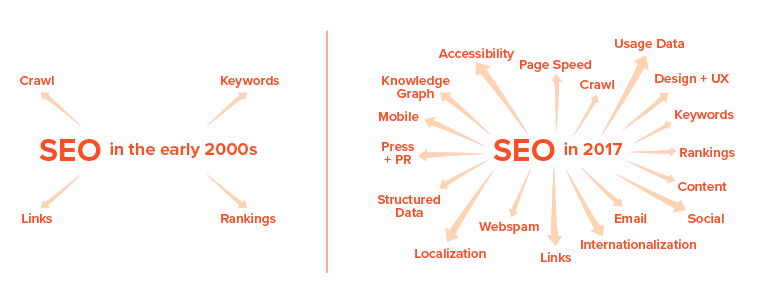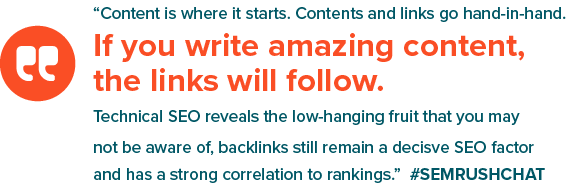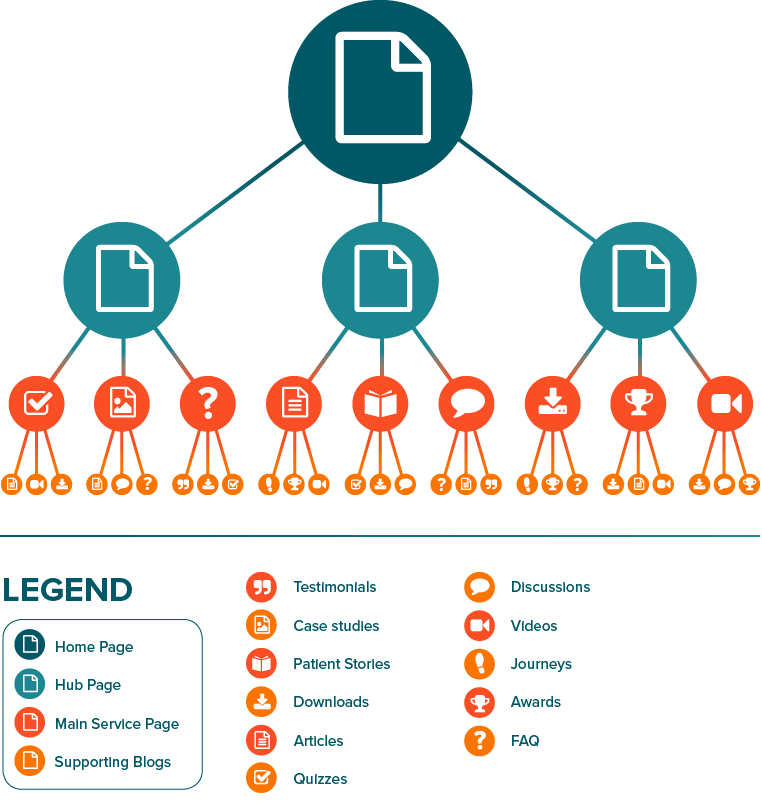You Know About Holistic Dentistry – But What is Holistic SEO?
You’ve probably heard all the buzz about the “holistic” approach to dentistry and the benefits of treating the “whole person” and not just the symptoms. Google is taking the same approach when it comes to your marketing and SEO, and it’s called holistic SEO.
What is Holistic SEO? How Does it Affect My Website?
SEO was pretty simple in the past: Have the right keywords on a page with some solid links and you would get good page ranking. Traditional SEO focused on getting traffic to a site but paid little attention to the actual needs or wants of internet searchers. While a site received a lot of traffic, it produced little to no conversions.
Fast forward to 2017, SEO has become more sophisticated and complex (holistic!), making it more user-friendly. Google uses many different signals to determine the value of information and its ranking.

Holistic SEO is simple: Giving users a great experience and supplying what they are looking for results in higher conversions and better ranking. Isn’t that what you want?
Holistic SEO takes all of the different aspects of SEO and digital marketing and makes them work harmoniously together to produce a better user experience, resulting in better ranking for your business and better user experience. It looks at the whole picture. A holistic SEO strategy includes using these four important contributing factors:
- Long-tail keywords catering to the specific needs of search users.
- Link building that is natural and organic, emphasizing social relationships.
- Content marketing, including quality content on your website, social media, and PPC ads.
- Site structure, making it easy for visitors and search engines to move around your site.
This philosophy carries through to your website. Great links, a solid keyword structure, fabulous content, and clear site hierarchy must all work together to produce a website that gives a great user experience.
1. Solid Site Structure = Great User Experience
Have you ever been on a website that is hard to navigate? Frustrating, right? A well-designed website should make it easy to find what you are looking for, encourage you to stay and look around and make you want to come back. Building a solid site structure is important in providing great user experience.
In turn, an excellent site structure will increase your rankings in the search engines. Web crawlers (Google bots) crawl a website’s structure. Their goal is to index the content to return it in search results. The better your site structure, the easier the crawlers can access and index the content – Google loves that!
Along with site structure, page speed is another important ranking factor that ties heavily into a good user experience. Desktop websites should load in three seconds or less while mobile websites should load in two seconds or less.
Imagine your website is like a hotel, pictured above. Some of the rooms are run-down and in need of a remodel. But there’s a really fabulous, beautiful room on the top floor. Are guests going to be willing to climb the creaky, run-down stairs to try to find that one nice room?
Similarly, even if you have one or two amazing pages on your website, that doesn’t mean users will want to make the proverbial “climb” to try to find them! Your site structure needs to be easy to navigate and the pages ALL need to be up-to-date, fast-loading, and user-friendly.
2. Content is Still Key
“Content is king, SEO is dead.” Have you heard this before? Well, both are somewhat true. Without quality content, you won’t rank at all and be on the top. Same goes with SEO: If you are still hanging on to what worked in 2002 (or even 2012!), then your marketing strategy is dead.

With all the major search engines focusing on user experience and delivering the best results for their searchers, the need for a well-structured website with quality content is more important than ever before.
It’s equally crucial you update your website’s content regularly. Updating your site’s content demonstrates to search engines you’re relevant and you’re continually making updates to your site to better your customer’s experience.
Take a look at your website’s content, and ask yourself:
- Does each page on my website hold value for visitors?
- When was the last time I added unique/fresh content to each page?
- How does my content stack up against my competition?
- Can I help people get rid of barriers, see benefits, or present proof to make my pages more valuable?
- Can I add a case study, a patient story, more actual photos, or an informal, informative video?
- Have I added a promotion or call to action to make users take action now?
If it has been more than two to three years since you refreshed your content, you HAVE to invest time and money to actively get a strategy plan to update your pages in the next year to stay competitive.

3. Long-tail Keywords Give Searchers What They Want
A correctly optimized website needs the right keywords working together to enhance each other. Long-tail keywords are important both for building on that keyword structure and for enhancing user experience. Why? Well, think about the way you search the internet.
Do you often type a full sentence or a question in the search bar?
-
- “What is the capital of Washington?”
- “What is the score of the Seattle Mariners’ game?”
- “How many times a week should I exercise?”
Most people do. We use these longer queries as long-tail keywords in our blogs and some pages. The result? Google sees you are trying to give searchers what they are looking for. In turn, you’ll gain better indexing from the search engines, and will most likely gain a conversion from a happy searcher who found what they were looking for.
4. Gaining Links That Have Value
Google is more discerning when it comes to linking. It can tell good links from bad links. What is Google looking for? It uses three criteria to decide the value of links:
-
-
- Number of links
- Link authority
- Link diversity
-
Quality backlinks are links pointing to your website from another website with higher page authority than your current site. Google shows customers (the searcher) the best search results possible and one way it does this is by ranking sites by their authority. So when you’re looking to add new sites to your backlink strategy, make sure you select sites with higher PageRank than your site.
Backlinking signals are crucial in every marketing strategy – they’re 29% of Google’s organic ranking factors and 17% of local ranking factors.
Roadside’s holistic SEO strategy for getting valuable links involves three components:
-
-
- Keep it relevant – This is one of the most important criteria. Links should blend organically with your content.
- Let authority sites be your friend – The stronger the site, the better the results for you.
- Focus on real websites – With real traffic.
-
What Can You Expect From Roadside?
You have a business to run, and you shouldn’t need to worry about staying on top of Google’s updates. We get you! Holistic SEO is an ever-evolving industry. In the past few years, we’ve seen Google make a steady push for rich content, quality links, clear site structure, and good keyword strategy.
If you’re a current Roadside client, you’ll be receiving an 18-month marketing strategy with detailed plans on how we’re working to get you to the top in your prospective market.
Are you looking for results fast? Sometimes the regular monthly marketing budget is not enough to complete everything that’s planned, and/or you may want to kick ass a little faster. This is why we offer our Marketing Strategy Boosts and other holistic SEO Boosts, so you can get in the driver’s seat and add some high-octane gas to your strategy.
Not sure what you need? We’re here to help! Get in touch with Angela and have an honest conversation about your marketing.




